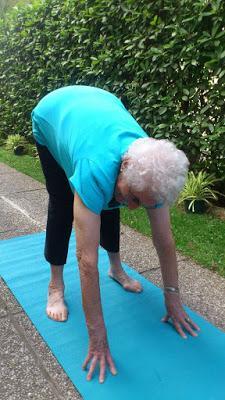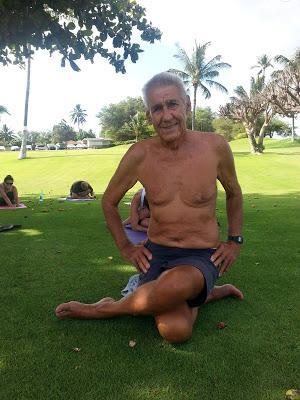 “Scientists are discovering something very peculiar about aging: How we feel about getting old matters. A lot. In test after test, researchers are finding that if we think about getting older in terms of decline or disability, our health likely will suffer. If, on the other hand, we see aging in terms of opportunity and growth, our bodies respond in kind.” —Anne Tergesen from “To Age Well, Change How You Feel About Aging.”
“Scientists are discovering something very peculiar about aging: How we feel about getting old matters. A lot. In test after test, researchers are finding that if we think about getting older in terms of decline or disability, our health likely will suffer. If, on the other hand, we see aging in terms of opportunity and growth, our bodies respond in kind.” —Anne Tergesen from “To Age Well, Change How You Feel About Aging.”I think we all understand that the tendency of media to portray only thin, young white females doing yoga is not a good thing, as it makes people who don’t fit into that limited category (most of the world’s population!) feel as if yoga might not be for them. And, of course, that’s sad because this stereotype of who can do yoga means that a lot of people could benefit from the practice will be missing out. But now I’ve learned that these kinds of stereotypes can be particularly harmful to older people. According to a recent article in the Wall Street Journal To Age Well, Change How You Feel About Aging (which cited several scientific studies), negative stereotypes about aging affect the beliefs of older adults about the aging process, potentially causing them to do serious harm to their health without realizing it. “Scientists aren’t sure exactly how holding negative stereotypes affects health, but they say it’s clear that there is a connection, and it isn’t simply correlation. In test after test, negative stereotypes have been shown to lead to poor health results. Over the past two decades, dozens of studies from psychologists, medical doctors and neuroscientists have shown that older people with more negative views of aging fare more poorly on health than those with less-pessimistic attitudes.“Even when study participants have similar health, education levels and socioeconomic status, those with more negative outlooks about aging show greater declines in a variety of areas over time. They have shakier handwriting, poorer memories, higher rates of cardiac disease and lower odds of recovering from severe disability, according to studies by Prof. Levy. They are less likely to eat a balanced diet, exercise and follow instructions for taking prescription medications as they age. They even die younger—the median difference in survival rates is 7.5 years.”Well, all that certainly makes me feel good about our ongoing photo contest, showing people over 50 doing yoga (see Photo Contest Open for All People Over 50). But, of course, a single photo contest isn’t going to counteract the negative stereotypes of older people we are bombarded with on a daily basis, whether it’s through exclusion (lack of older women in Hollywood movies, for example) or through portrayals that show older people as ridiculous or incapable. So what can we do about this?The Wall Street Journal article actually provided four steps for counteracting these negative stereotypes. Because each step relates directly to a yogic concept or technique, I’m going to summarize the steps for you here, adding my own interpretations about how they relate to yoga (see To Age Well, Change How You Feel About Aging for complete information on the steps). 1. Understand the myths vs. the facts. Rather than simply accepting received wisdom about what getting older means, you should actively inform yourself. In yoga, educating yourself is an important aspect of svadhyaya, or self study (see The Power of Svadhyaya (Self Study), Part 2). On our blog, we’re providing you with a wealth of information about what is known about the aging process and how yoga can help foster healthy agiing. But reading more general information about aging and health elsewhere seems like a good idea. I was interested to read in “To Age Well, Change How Your Feel About Aging,” that “our moods, relationships and overall sense of well-being actually can improve with age, as can knowledge and certain types of intelligence.” I know that this had been my own experience, but it was good to learn that other older people in general have similar experiences.
2. Recognize stereotypes in everyday life. Because we are bombarded by negative views of aging without being aware of it (the ads during a football game come to mind), paying attention is an important way to lessen the impact. So if you haven’t been observing this phenomenon, start by noticing. The next step is to become more aware of your own thoughts about older people and aging. This is another form of svadhyaya (see The Power of Svadhyaya (Self Study), Part 1). Use your witness mind to observe your thoughts regarding aging, particularly noticing the stereotypes you yourself have regarding aging and whether you tend to blame things automatically and reflexively on age.
3. Substitute positive images for negative stereotypes. After you’ve noticed the negative stereotypes in the culture at large as well as in your own mind, you can actively counteract them by intentionally searching for better role models, whether they are older family members or friends or people in public eye. This step directly ties into the yogic concept of pratipaksa-bhavanam, or cultivating the opposite, which I discussed in my post The Biochemical Basis for Gratitude:II.33 Upon being harassed by negative thoughts, one should cultivate counteracting thoughts. —translated by Edwin Bryant
Here’s are some photos to get you started.

Nonnina Victoria, Age 101

George Boskoff, Age 90
Or, maybe you just need to look in the mirror. I’ve seen your photos, yoga friends, and you’re all looking pretty wonderful.4. Accept the aging process. Of course, it is also important not to expect an entirely positive experience of aging because that is as unrealistic as expecting only a negative experience, and so is bound to bring difficulties. As Anne Tergesen put it, “The key is to hold both positive and negative in balance and really understand and own the aging process.” That sounds like the niyama santosha (contentment), which TKV Desikachar defined as:“Contentment or the ability to be comfortable with what we have and what we do not have.” —TKV DesikacharSee Yoga Philosophy: Contentment for information about cultivating contentment.
Interestingly, according to Anne Tergesen, one good way to cultivate contentment with the aging process is by exercising. She cites a 2012 study Views on aging and emotional benefits of physical activity: Effects of an exercise intervention in older women that showed exercise can cause people feeling better about the aging process, saying, “These women were more physically fit, more alert and had better executive functioning. The positive experience of exercising affected their well-being and improved attitudes about aging.” So practicing asana, which tends to make people feel good in general, is also going to help you feel better about the aging process.Fighting the negative stereotypes in our culture about aging and older people isn’t necessarily an easy task. But, fortunately, as you can see, yoga provides a wealth of options for helping us to feel differently about aging, including our asana practice as well as mindfulness practices, cultivating the opposite, and contentment practices.
Subscribe to Yoga for Healthy Aging by Email ° Follow Yoga for Healthy Aging on Facebook ° Join this site with Google Friend Connect

